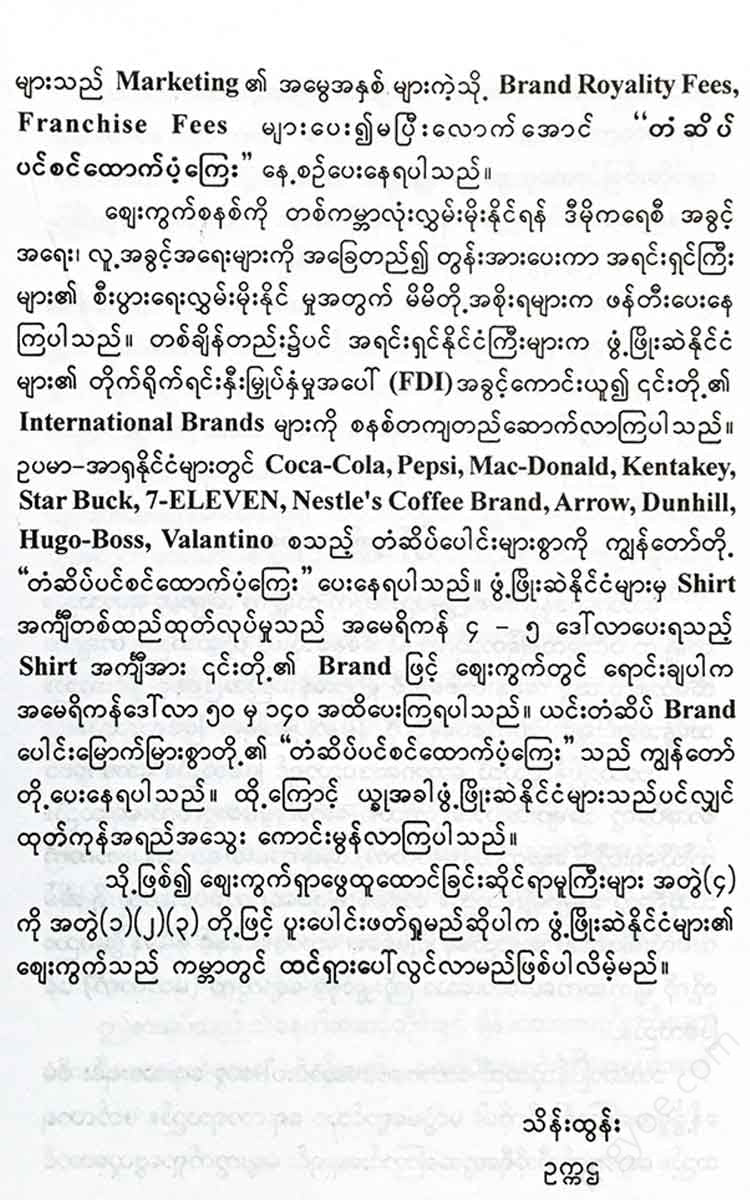Other Websites
Maung Kispa - The Principles of Marketing and Establishment, Volume 4
Maung Kispa - The Principles of Marketing and Establishment, Volume 4
Couldn't load pickup availability
Everyone makes a living by selling something. We are familiar with the way that business organizations use sales forces to sell goods and services to customers around the world. In addition, sales forces are found in a variety of other organizations. For example, colleges employ new recruits to recruit new students. Churches use membership committees to recruit new members. Hospitals and museums organize fundraisers to collect money from donors in their communities. Even the U.S. Postal Service, a government agency, uses sales forces to deliver mail and other services to its customers. The Department of Agriculture sends agricultural experts to sell new farming methods to farmers. In this chapter, we will examine the face-to-face selling aspect of organizations. We will also explain management decisions to sales teams and the principles of self-selling.
The role of personal selling
(The Role of Personal Selling)
There are many different types of personal selling activities. The role of personal selling can vary from company to company. This chapter will explain the nature and scope of personal selling, and the role of the sales force in the modern marketing organization.
The nature of personal selling
(The Nature of Personal Selling)
Selling is one of the oldest professions in the world. People who work in sales are called by many names: Sales people, Sales representatives, Account executives, Sales Consultants, Sales Engineers, agents, district managers, marketing representatives, and account development representatives.
People see salespeople in many different ways, and some of them are not very appealing. The salesman may come to mind as the pitiful character Willie Loman in Arthur Miller’s “Death of a Salesman.” Or the cigar-smoking, sly, and sarcastic Harold Hill in Meredith Wilson’s “The Music Man.” In both novels, salesmen are portrayed as walking alone, carrying an umbrella, and going from one end of the street to the other, trying to persuade unwilling or unwilling buyers to buy their products.
However, modern salespeople are very different from those salespeople. Most of today's modern salespeople are educated professionals. They are well-trained in the business. They listen carefully to the needs of customers and build long-term relationships with them. They assess the needs and problems of customers and solve them according to the company's efforts. Boeing dominates the global aviation market, with a market share of 55 percent. They can sell expensive airplanes with a smile or a friendly handshake.
The term salesperson covers a wide range of positions. At one extreme, salespeople can be order takers, such as those who stand behind the counter in a department store. At the other extreme, they are order getters. Their positions require creative selling skills to sell products and services. Salespeople can range from consumer electronics and industrial equipment to aviation insurance policies, advertising, and consulting. Some salespeople engage in missionary selling. These salespeople do not expect to win orders. Their job is to build goodwill or educate customers. For example, salespeople for pharmaceutical companies meet with doctors to explain the company’s products. It is to encourage them to prescribe these drugs in their treatment. The focus here should be on more creative sales models and processes for building and managing an effective sales force.
The role of the sales force
(The Role of the Sales Force)
Personal selling is the interpersonal part of the promotional mix. Advertising is a one-way, non-personal communication with a target audience. In contrast, personal selling is a two-way, personal communication between the salesperson and the target audience. This communication can be face-to-face, over the telephone, via video conference, or by other means.
Personal selling can be more effective than advertising in complex sales situations. Salespeople can do more research to learn about the problems of customers. They can tailor their sales offers to the specific needs of each customer. They can negotiate prices. They can build long-term personal relationships with key decision makers.
The role of personal selling varies from company to company. Some companies do not have salespeople at all. For example, companies that sell goods through mail-order catalogs, companies that sell through manufacturers' representatives, and companies that sell through sales agents and brokers do not have salespeople. However, in most companies, salespeople play an important role. In companies that sell business-related products, such as Xerox and Du Pont, salespeople work directly with their customers. In fact, for many customers, salespeople are the only contact, and the sales force is the company itself. Companies that sell consumer goods sell through intermediaries, so it is difficult for the final consumer to meet the company's salespeople. They may not even know them. Even so, sales forces play an important role behind the scenes. They work with wholesalers and retailers. In this way, they can negotiate between wholesalers and retailers. They can negotiate prices. They can establish long-term personal relationships with key decision makers.
The role of personal selling varies from company to company. Some companies do not have salespeople at all. For example, companies that sell goods through mail-order catalogs, companies that sell through manufacturers' representatives, and companies that sell through sales agents and brokers do not have salespeople. However, in most companies, salespeople play an important role. In companies that sell business-related products, such as Xerox and Du Pont, salespeople work directly with their customers. In fact, for many customers, salespeople are the only contact, and the sales force is the company itself. Companies that sell consumer goods sell through intermediaries, so it is difficult for the final consumer to meet the company's salespeople. They may not even know them. Even so, the sales force plays an important role behind the scenes. They work with wholesalers and retailers. In this way, the wholesalers and retailers



















